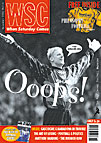 After a spate of sackings in Scotland Gary Oliver provides a recap of the carnage
After a spate of sackings in Scotland Gary Oliver provides a recap of the carnage
Only a quarter of the Scottish League season gone, but already a number of the managers listed in this year’s Rothmans are history. To follow the complex trail of resignations and sackings requires the aid of a flow chart ; that, however, would tell nothing of the machinations that have accompanied the cull.
Even before August was out, vacancies were being advertised in both Paisley and Kirkcaldy. Chicanery by St Mirren’s directors is nothing new: these are the serial sackers that dismissed, among others, Alex Ferguson and Alex Smith, the latter only months after winning the Scottish Cup. On this occasion, with Saints reputedly heading towards bankruptcy faster than the Duchess of York, coach Kenny McDowall became the victim of downsizing – much to the chagrin of boss Jimmy Bone, who promptly resigned in sympathy. Smirks all round in the Love Street boardroom.
Bone soon had company down at the Jobcentre: Raith Rovers, still pointless after three matches, “invited” Jimmy Thompson to revert to the post he held only three months earlier, that of youth team coach. Not surprisingly, it was an offer Thompson could most certainly refuse.
Anxious to waste no time, Rovers immediately hired Tommy McLean – an experienced escapologist, who, since his acrimonious split from Hearts, had enjoyed a lengthy sabbatical, much of it spent in BBC studios. Predictably, McLean’s many buddies in the media hailed his appointment as a major coup; fans, though, were more dubious, and the applause that greeted his appearance at Stark’s Park contained many slow handclaps.
But the real fun then began. Having spent the previous week in court claiming wrongful dismissal by Hearts, Tommy McLean was due to conduct his first proper training session at Raith; but he instead was installed as Dundee United’s new manager, just hours after the club’s chairman, brother Jim, had pushed Billy Kirkwood onto his sword.
Lauded days earlier, suddenly Tommy McLean became a pariah. And McLean senior emerged looking downright foolish: it now cost £60,000 in compensation to secure his brother – who had been out of the game for fourteen months and freely available until a week before.
The unexpected stampede to hire Tommy McLean made little sense: in spite of of his guiding Motherwell to the Scottish Cup in 1991 – a triumph on which the club abjectly failed to capitalize – he seldom won from fans more than grudging respect; indeed, during ’Well’s many flirtations with relegation, a bullet-proof vest seemed a wise precaution. And throughout his subsequent year at Tynecastle, McLean shamefully neglected Hearts’ young talent; consequently, it’s difficult to imagine Tom would now be at Tannadice had big brother Jim not been determined to appoint a facsimile of himself.
St Mirren, meanwhile, seemed to have found their man: Hamilton boss Iain Munro looked set for a return to the club where he won seven caps, and described the prospect as a “homecoming”. The fatted calf was slaughtered, but the prodigal Munro instead formed a cabal with . . . Raith Rovers. Ahem.
Not until the following week did Raith confirm him as their new boss But the interval fooled no-one, nor did Munro’s explanations of his volte face bear scrutiny. Iain first accused St Mirren of a premature announcement, yet it came after he had relinquished his post at Hamilton; he then cited a schism in the boardroom over his appointment, but it would have been extraordinary if Saints’ nine man committee had been unanimous on such an issue. Quite simply, a more attractive suitor turned the boy’s head.
An obvious contender for the Raith vacancy, because of his success ten miles up the coast, had seemed to be East Fife’s Steve Archibald. But Methil always seemed an incongruent location for the cosmopolitan Archibald, and since he excoriated he directors for refusing to go full-time following promotion to the First Division, his was a sacking waiting to happen. On signing Jimmy Bone, the man who unwittingly triggered Scotland’s version of the Borgias, the Fifers seemed to have reassembled the jigsaw. But, just when it appeared the pieces were safely boxed, Alex Miller took Hibernian fans’ advice and resigned after a decade – it seems longer – at Easter Road.
And if pundits and punters are on opposite sides of the fence over Tommy McLean’s abilities, then a chasm separates their differing opinions of Miller. The Scottish press was unanimous in denouncing his critics: the Daily Express even went so far as to portray the ex-Ranger as a “victim of shameful East coast bigotry”, while chairman Douglas Brom assigned Miller’s retreat to “evil people”. The more mundane truth is that Hibees overwhelmingly were sick of the fare being served: all too often the manager’s cautious, inhibited persona percolated down to the team.
Their Skol Cup victory five years ago aside, Miller and his charges repeatedly failed their tests of character: time and again Hibs meekly surrendered in the cups, often to First Division sides, and their five-year famine in the Edinburgh derby became a music hall joke. Miller continues to enjoy the part-time patronage of Scotland boss Craig Brown, and is widely regarded as his heir apparent. But that remains mere hypothesis. Alex Miller must now scrap against Messrs Thompson, Kirkwood and Archibald to grab a new chair when next the music stops.
From WSC 118 December 1996. What was happening this month